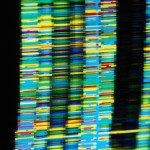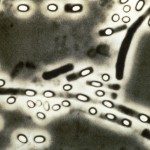Link to Pubmed [PMID] – 19343203
PLoS Pathog. 2009 Apr;5(4):e1000359
Lethal toxin (LT) is a critical virulence factor of Bacillus anthracis, the etiological agent of anthrax, whose pulmonary form is fatal in the absence of treatment. Inflammatory response is a key process of host defense against invading pathogens. We report here that intranasal instillation of a B. anthracis strain bearing inactive LT stimulates cytokine production and polymorphonuclear (PMN) neutrophils recruitment in lungs. These responses are repressed by a prior instillation of an LT preparation. In contrast, instillation of a B. anthracis strain expressing active LT represses lung inflammation. The inhibitory effects of LT on cytokine production are also observed in vitro using mouse and human pulmonary epithelial cells. These effects are associated with an alteration of ERK and p38-MAPK phosphorylation, but not JNK phosphorylation. We demonstrate that although NF-kappaB is essential for IL-8 expression, LT downregulates this expression without interfering with NF-kappaB activation in epithelial cells. Histone modifications are known to induce chromatin remodelling, thereby enhancing NF-kappaB binding on promoters of a subset of genes involved in immune response. We show that LT selectively prevents histone H3 phosphorylation at Ser 10 and recruitment of the p65 subunit of NF-kappaB at the IL-8 and KC promoters. Our results suggest that B. anthracis represses the immune response, in part by altering chromatin accessibility of IL-8 promoter to NF-kappaB in epithelial cells. This epigenetic reprogramming, in addition to previously reported effects of LT, may represent an efficient strategy used by B. anthracis for invading the host.




